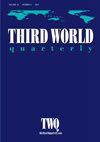China’s relational power in Africa: Beijing’s ‘new type of party-to-party relations’
IF 1.8
2区 经济学
Q2 DEVELOPMENT STUDIES
引用次数: 0
Abstract
Abstract Using a Chinese conceptualisation of social capital—Qin Yaqing’s ‘relational theory of world politics’ (i.e. ‘relationality’)—along with informal interviews and two decades of official data this study explains how and why the International Department of the Central Committee of the Communist Party of China (ID-CPC) is building relationships with African political elites. It shows how the department has become the institutional embodiment of relationality—the primary party organ tasked with enhancing what Qin calls China’s ‘relational power’ with like-minded political partners regardless of their ideology. The ID-CPC offers its African counterparts bilateral and multilateral ‘host diplomacy’ and ‘cadre training’ programs that share Chinese governance methods and rewards them for their praise and political support. Relationality helps explain why the ID-CPC continues to expand and deepen its relationships with African political elites, maintained them virtually during COVID-19, and quickly restarted in-person exchanges as soon as China’s pandemic travel restrictions were loosened in early 2023. The literature on social capital theory has long been based on Western experiences and notions of relationship building. Applying Qin’s distinctly Chinese conception of social capital to systematic empirical data reveal how traditional Confucian sociocultural practices continue to shape China’s contemporary international relations.中国在非洲的关系大国:北京的“新型党际关系”
本文章由计算机程序翻译,如有差异,请以英文原文为准。
求助全文
约1分钟内获得全文
求助全文
来源期刊

Third World Quarterly
DEVELOPMENT STUDIES-
CiteScore
4.10
自引率
15.00%
发文量
137
期刊介绍:
Third World Quarterly ( TWQ ) is the leading journal of scholarship and policy in the field of international studies. For almost four decades it has set the agenda of the global debate on development discourses. As the most influential academic journal covering the emerging worlds, TWQ is at the forefront of analysis and commentary on fundamental issues of global concern. TWQ examines all the issues that affect the many Third Worlds and is not averse to publishing provocative and exploratory articles, especially if they have the merit of opening up emerging areas of research that have not been given sufficient attention. TWQ is a peer-reviewed journal that looks beyond strict "development studies", providing an alternative and over-arching reflective analysis of micro-economic and grassroot efforts of development practitioners and planners. It furnishes expert insight into crucial issues before they impinge upon global media attention. TWQ acts as an almanac linking the academic terrains of the various contemporary area studies - African, Asian, Latin American and Middle Eastern - in an interdisciplinary manner with the publication of informative, innovative and investigative articles. Contributions are rigorously assessed by regional experts.
 求助内容:
求助内容: 应助结果提醒方式:
应助结果提醒方式:


